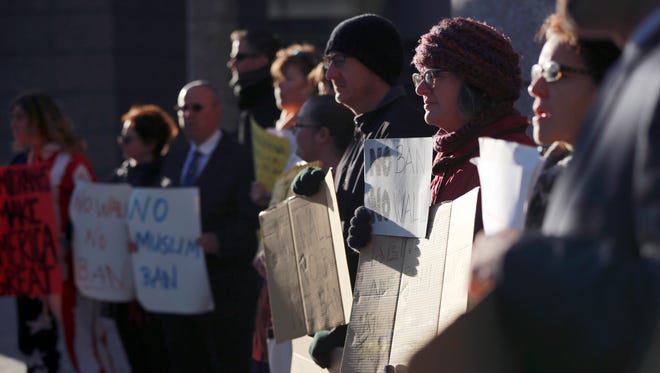Muslim-Mexican scapegoats in Trump’s America: Voices
We used to think our hybrid family was the future of our nation. Now we wonder if we should move.

My Iranian relatives abroad can no longer come visit, and the relationship between the United States and my husband's home country of Mexico is on the rocks. As a result of President Trump’s actions on immigration and refugees, this is the new America for us and for our son — who is both Mexican and Iranian, both a Muslim and a Christian.
My husband and I are law professors and have previously worked in corporate law firms, international organizations and think tanks where we supported and advanced American interests. Until Trump’s presidency became a reality, we thought our family was the future of this country. Now we wonder if we should look for another home.
In his inauguration speech, Trump described “American carnage,” building on his campaign rhetoric of a country under siege from refugees and immigrants, particularly Mexicans and Muslims. Behind this rhetoric of “America first” is an attempt to redefine who belongs in America and who doesn’t. In this definition, my family and I are the scapegoats. And we are feeling the flames of the sacrificial fire.
I have relatives in Iran with visas to come to the U.S. that they cannot use now that Trump banned the citizens of Iran (and six other predominantly Muslim countries) from entering the U.S. on any visa category. The mother who was separated from her five-year-old while he was detained for hours in Dulles Airport outside Washington is a friend of my own son’s day care teacher from last summer.
My phone has been ringing nonstop with family and friends abroad asking questions about what this means for them. They do not understand why Iran is on the list, when no refugees from Iran have killed anyone in terrorist attacks in the U.S. (This is also true of the other six countries on the list.)
Refugee ban trapped my Iraqi translator: Veteran
Trump refugee mess previews failures ahead: Marc Ambinder
We have friends in the United States who are afraid to wear head scarves or other signifiers of their Muslim faith. We have friends who are afraid to speak Spanish and Persian in public, the former for fear they will be targeted as “illegals” and the latter for fear that they will be targeted as terrorists.
Given that hate crimes are shown to coincide with Trump’s rhetoric, I understand their fear. It has only intensified with the fatal shootings at the mosque in Quebec on Sunday and the recent fire that burned a Texas mosque.
My husband and I are both fair-skinned and can often “pass” as white, but we have experienced our share of hate. When he spoke Spanish with his Mexican-American barber in Tucson, my husband and the barber were told by another customer that they should no longer expect handouts.
My husband is worried about his family in Mexico. The peso is already down about 18% against the U.S. dollar just since the election, trading close to its all-time low of 22.0385. He worries that Trump’s policies of building a wall, making them pay, and sending them back will cripple the Mexican economy and leave his parents, siblings and friends struggling.
My own brother, who is both dark-skinned and, obviously, a man, and who happens to sport a beard not for religious reasons but out of personal preference, is not comfortable leaving his neighborhood in Washington because of the many times he has been called a “sand n-----” when venturing outside of his progressive enclave.
Trump and his supporters claim that they are not racists. Trump’s chief of staff Reince Priebus has said that Trump will be a president for everyone. But at our dinner table, when we discuss the news of the day, we do not feel included as part of Trump’s America. Quite the opposite, in fact. We feel besieged.
POLICING THE USA: A look at race, justice, media
Trump's extreme vetting for refugees? Already here: Column
When we talk about the news, we talk about how we are being targeted because of the countries we were born in, the languages we speak, and the religion of our grandfathers. We talk about whether we would feel safer if my husband adjusted his status from a green card holder to a citizen. We talk about how we should stop putting off getting our son his Mexican passport so that we can live in Mexico if we need to. We debate whether we should stay and resist discriminatory policies and speak out against rhetoric that targets our communities. But as the heat of the sacrificial fire burns hotter, so does our desire to be in a place where we feel welcome.
What gives us hope is the outpouring of support for detained travelers across the country. The protests and legal actions that have sprung up in response to Trump's executive order suggest an alternate narrative to the xenophobia espoused from his White House. This show of solidarity — from protesters, lawyers, representatives and my own supportive neighbors and friends — have reassured me of one thing: The best of America is standing up for inclusive American values in response to the fear-mongering promoted by the worst of America.
Negar Katirai is an assistant clinical professor and the director of the Community Law Group at the University of Arizona’s James E. Rogers College of Law. Sergio Puig is associate professor of law and director of the International Economic Law and Policy Program at the University of Arizona’s James E. Rogers College of Law.
You can read diverse opinions from our Board of Contributors and other writers on the Opinion front page, on Twitter @USATOpinion and in our daily Opinion newsletter. To submit a letter, comment or column, check our submission guidelines.